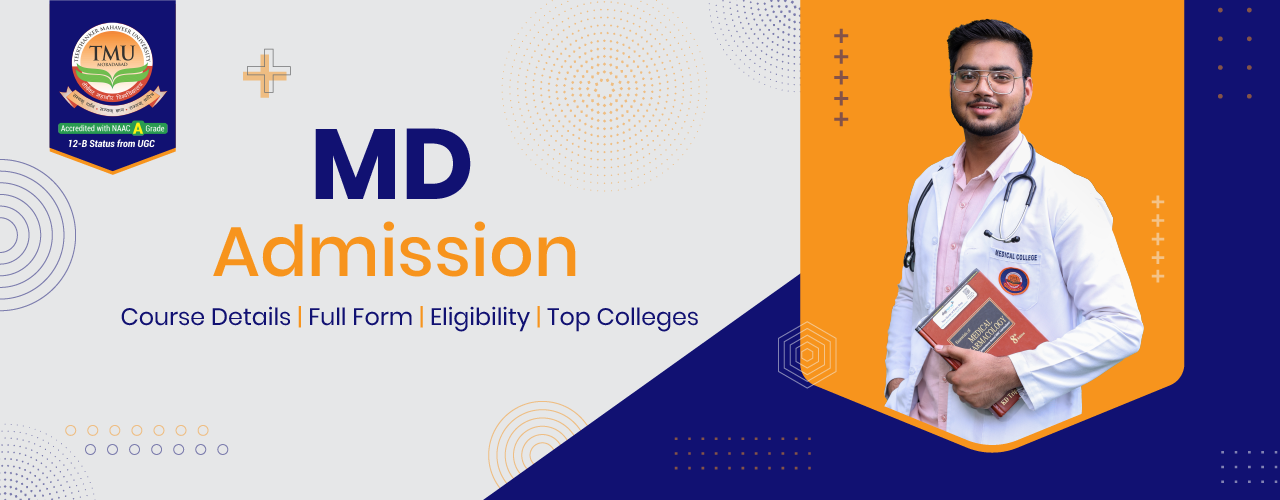MD Course Details, Full Form, Fees, Admission, Eligibility, Syllabus, and Career
Table of Contents
The full form of MD is Doctor of Medicine. The MD degree stands as one of the most prestigious and sought-after postgraduate qualifications in the healthcare sector. This program typically lasts 3-7 years depending on your specialisation and country. It involves 1-2 years of coursework followed by 3-7 years of residency for hands-on training under specialist supervision in your chosen field.
Now, before you embark on this exciting journey, it's important to understand the eligibility requirements. Typically, to be accepted into an MD program, MD programs in India require an MBBS degree (or equivalent) with good marks (often 50% minimum), completion of a 1-year internship, and qualifying entrance exams (NEET-PG, INI CET etc.).
In this blog, we shall understand the details of the MD course, exploring its full form, fees, admission process, syllabus, and the promising career prospects it offers. Whether you're a recent MBBS graduate or a practising doctor aiming to enhance your skills, this blog will provide you with essential insights to navigate your path toward becoming a highly specialised medical professional. And will be discussing the wide range of MD Course Fees in India.
MD Full Form
MD full form is a Doctor of Medicine. It is a postgraduate degree awarded to medical professionals who have completed advanced training in a specific field of medicine. The MD degree is equivalent to the MBBS (Bachelor of Medicine, Bachelor of Surgery) in terms of medical education but represents a higher level of specialisation.
Teerthanker Mahaveer University
Apply for Admission
Click Here To Apply for Admission
MD Course Details
The MD (Doctor of Medicine) course is a postgraduate medical qualification lasting 2 to 3 years, depending on the specialisation and country. It focuses on advanced training in specialities like Internal Medicine, Surgery, Paediatrics, and more. Admission requires a completed MBBS or equivalent, relevant experience, and successful entrance exam results.
The curriculum includes intensive study of the chosen speciality, research, clinical rotations, and practical training under supervision. Graduates gain hands-on experience in hospital settings and often undertake research projects.
MDs are essential in hospitals, clinics, research centres, and academia. The qualification is recognised globally, offering diverse career opportunities in specialised medical fields, patient care, research, and healthcare management.
MD Course Duration
The MD course duration can vary depending on the country and specific specialization, but here's a general breakdown:
- Typical Range: 3-7 years
- Breakdown:
- Coursework: 1-2 years
- Residency Program: The bulk of the program, typically lasting 3-7 years. This involves supervised clinical training in your chosen speciality.
Additional factors affecting duration:
- Specific Specialization: Some specialities, like surgery, might require longer residencies.
- Research Involvement: Some programs might incorporate research projects, extending the overall time.
Examples:
- Internal Medicine: Typically a 3-year residency program.
- Neurosurgery: A demanding speciality with a 7-year residency program on average.
MD Specialisations
MD (Doctor of Medicine) is a postgraduate degree program that allows medical professionals to specialise in a specific area of medicine. There are numerous MD specialisations available, each with its own focus and career path. Here are some of the most common MD specialisations:
- Internal Medicine: Focuses on the diagnosis and treatment of adult non-surgical diseases.
- Pediatrics: Deals with the medical care of infants, children, and adolescents.
- Obstetrics and Gynecology (OB-GYN): Specializes in pregnancy, childbirth, and the female reproductive system.
- Anesthesiology: Manages pain relief before, during, and after surgery.
- Dermatology: Deals with the diagnosis and treatment of skin, hair, and nail conditions.
- Psychiatry: Focuses on mental health, including diagnosis and treatment of mental, emotional, and behavioural disorders.
- Neurology: Specializes in the nervous system, including the brain, spinal cord, and nerves.
- Cardiology: Deals with the diagnosis and treatment of heart disease.
- Pulmonology: Focuses on the respiratory system, including the lungs and airways.
- Radiology: Uses medical imaging techniques like X-rays, CT scans, and MRIs to diagnose and treat medical conditions.
This list is not exhaustive, and there are many other MD specialisations available. The best way to choose an MD specialisation is to consider your interests, skills, and career goals.
Why Choose MD Course?
While anybody who wishes to pursue a course in Doctor of Medicine can do so by fulfilling the basic eligibility requirements for the same, there are several reasons why a Doctor of Medicine Course is a better career path in comparison to others.
- Students pursuing a Doctor of Medicine Degree have higher chances of gaining in-depth knowledge for practical training, along with intricate details of the professional field.
- With the ever-growing demand for professionals in the healthcare sectors all over the world, the more the number of specialised professionals, the better the scope for individuals to grasp holistic professional growth at an increased pace.
- Students pursuing a Doctor of Medicine Degree can easily grab opportunities abroad with lucrative packages and better career growth options.
- The scope for a Doctor of Medicine is expected to increase with the development of science and technology.
MD Eligibility Criteria
To pursue a Doctor of Medicine course, all aspirants will have to meet the eligibility criteria provided by the concerned authorities. The eligibility criteria for MD and its specialisations in India are as follows:
- Candidates must have a valid MBBS degree from one of the recognised medical colleges or institutes in India or abroad.
- Admission to all medical courses in India is done on the basis of scores obtained in medical entrance examinations, i.e. NEET. Since MD is a PG degree, candidates must have a NEET-PG score/ rank, to be admitted in one of the MD specialisations in India.
- The minimum aggregate score requirement in the qualifying examination will vary from college to college. Therefore, all candidates are advised to visit the eligibility criteria outlined by the college of their choice.
- Candidates must complete one year of residency to be eligible for MD.
Required Skills for Doctor of Medicine (MD)
There are certain skills that make one the best MD for their patients. Patients should feel confident when approaching the doctor about their problems and trust the MD to treat them to the best of their ability.
| Skill | Description |
| Diagnosis Skill | Ability to diagnose disease on the basis of its symptoms |
| Interpersonal Skill | Ability to develop a relationship with the patients and build their faith and trust |
| Communication Skill | Strong verbal and listening skills to communicate with the patient and his family |
| Time Management Skill | Punctuality, ability to work for long hours and handle the pressure |
| Perseverance and Endurance | Possess patience to listen and devote hours to the patients |
| Team Working Skill | Ability to work in a team along with other physicians, experts and technicians |
| Critical Thinking and Problem-Solving Skills | Ability to handle a critical case and apply the remedial measures to provide relief to the patient |
MD Syllabus and Subjects
| Component | Description | Example Subjects |
| Coursework (1-2 years) | Focuses on in-depth knowledge specific to your chosen field. | * Physiology * Pathology * Pharmacology (specialised focus based on the chosen field) * Biochemistry * Anatomy (may have advanced topics specific to the field) |
Specialization-Specific Subjects (1-2 years) | Deep dive into your chosen field. | * Cardiology: Electrocardiography, Echocardiography, Interventional Cardiology, Cardiac Pharmacology, Advanced Cardiac Physiology * Neurology: Neuroscience, Neuroradiology, Electroencephalography, Clinical Neuroanatomy, Neuropharmacology * Pediatrics: Child Development, Neonatology, Pediatric Infectious Diseases, Pediatric Endocrinology, Pediatric Cardiology |
Clinical Rotations (3-7 years) | Apply theoretical knowledge in real-world settings. | Rotations specific to your chosen field, for example: * Cardiology Rotations: Inpatient cardiology, Cardiac ICU, Electrophysiology, Interventional Cardiology * Neurology Rotations: Stroke Unit, Movement Disorders Clinic, Epilepsy Monitoring Unit, Neuromuscular Clinic * Pediatrics Rotations: Well-child care, Neonatal ICU, Pediatric Emergency Medicine, Adolescent Medicine |
Research Projects (Optional) | Contribute to medical advancements in your field. | The topic is chosen in collaboration with a faculty advisor, relevant to your chosen speciality. |
Top MD Colleges and Universities in India
| University | Location |
| All India Institute of Medical Sciences (AIIMS) | New Delhi |
| Post Graduate Institute of Medical Education and Research (PGIMER) | Chandigarh |
| Christian Medical College (CMC) | Vellore, Tamil Nadu |
| Moradabad, Uttar Pradesh |
Additional factors to consider when choosing an MD program in India:
- Specialisation: Select a college with a strong program in your chosen field. Each college might have a particular focus area within specialisations (e.g., cardiology within internal medicine), so research their strengths.
- Entrance Exams: Research the specific entrance exam required for your desired specialisation (e.g., NEET-MDS for dentistry).
- Fees and Scholarships: Consider tuition fees and explore scholarship opportunities offered by the college, government schemes, or external organisations.
- Location and Infrastructure: Think about your preferred location and the college's facilities, including labs, libraries, and patient care settings.
Note: This is not an exhaustive list. Many other excellent MD colleges exist in India. Conduct thorough research to find the program that best aligns with your goals and aspirations.
Why Teerthanker Mahaveer University is the Best Choice for an MD Degree
Choosing the right institution for pursuing a Doctor of Medicine (MD) degree is a critical decision that can shape your medical career. Teerthanker Mahaveer University (TMU) stands out as an excellent choice for aspiring medical specialists. Here are several compelling reasons why TMU is the best place to pursue your MD degree.
TMU's MD programs offer:
- Prestigious accreditation and recognition
- Experienced faculty for top-notch education
- State-of-the-art facilities for hands-on learning
- Comprehensive clinical training with experienced practitioners
- Research opportunities to contribute to medical science
- Holistic development beyond academics
- Global exposure through international collaborations
- Competitive fees with scholarships available
- Strong alumni network for mentorship and career guidance
MD Course Fees
MD course fees in India can vary significantly depending on several factors:
- College/University: Government colleges generally have lower fees compared to private institutions.
- Location: Fees might be higher in metro cities compared to smaller towns or rural areas.
- Specialisation: Certain specialisations, like those requiring advanced technology or equipment, might have higher fees.
Here's a breakdown of typical MD course fees in India:
| Range | Description |
| ₹2,000 - ₹30,00,000 per year | This encompasses the vast spectrum of MD course fees in India. Government colleges typically fall within the lower range, while private colleges can reach the higher end. |
Additional factors to consider:
- Hostel fees: These can range from ₹5,000 to ₹2,50,000 per year, depending on the college and accommodation type.
- Entrance exams: There might be application fees associated with entrance exams required for specific MD programs.
- Examination fees: Universities might charge fees for semester exams and final degree certifications.
Resources for Specific Fee Information:
- University Websites: Most universities have dedicated pages for their MD programs, outlining the fee structure.
- Contact the Program: Reach out to the admissions department or program coordinator of the specific MD program you're interested in for the most up-to-date fee information.
MD Salary in India
| Factor | Description |
| Average Salary | ₹720,000 per year (approximately USD 9,000) |
| Salary Range | ₹325,000 - ₹2,218,500 per year (approximately USD 4,000 - USD 28,000) |
| Factors Affecting Salary | * Specialization (higher for some specialisations) * Experience (increases with experience) * Location (varies between metros, towns, and rural areas) * Work Sector (government vs private) |
| Additional Considerations | * Non-monetary benefits (health insurance, housing allowances, etc.) * Private practice potential (higher income but depends on patient volume and location) |
MD vs MBBS
| Feature | MD (Doctor of Medicine) | MBBS (Bachelor of Medicine and Bachelor of Surgery) |
| Level | Postgraduate | Undergraduate |
| Duration | 3-7 years | 4.5-5 years |
| Eligibility | Requires an MBBS degree or equivalent | Entrance exam after high school |
| Focus | Specialisation in a specific medical field (e.g., Cardiology, Neurology) | Foundation in general medicine and surgery |
| Training | Deep dives into the chosen field with coursework and residency training | Focuses on core medical knowledge and practical clinical skills |
| Career Path | Becomes a specialist in a chosen field (e.g., cardiologist, neurologist) | General practitioner, surgeon, or pursue further specialisation (MD) |
| Salary (India) | Varies based on specialisation, experience, etc. (Avg: ₹720,000/year) | Lower than MD salaries |
Analogy:
- MBBS: Building a broad foundation in medicine. Imagine it as the first few floors of a building.
- MD: Adding a specific floor on top of the MBBS foundation. You become an expert in a chosen area of medicine.
MD Career Options
| Career Path | Description | Example Roles |
| Clinical Practice | Direct patient care in your chosen specialisation. | Cardiologist, Neurologist, Pediatrician, Oncologist, Anesthesiologist |
| Research and Academia | Contribute to medical advancements through research or teaching. | Research Scientist, Clinical Trial Investigator, Medical College Professor |
| Public Health | Focus on preventive medicine and community health at a population level. | Public Health Officer, Epidemiologist, Healthcare Policy Analyst |
| Administration and Leadership | Utilize medical expertise in healthcare management or policy. | Hospital Administrator, Healthcare System Director, Healthcare Policy Advisor |
| Entrepreneurship | Establish your own private practice or healthcare facility. | Private Practice Physician, Clinic Owner, Specialized Healthcare Facility Director |
| Other Areas | Careers outside traditional medicine, leveraging your medical knowledge. | Medical Journalist, Medical Writer, Forensic Medical Examiner |
Conclusion
The MD course is a gateway to advanced medical knowledge and specialised skills, paving the way for a successful career in medicine. With a rigorous curriculum, extensive clinical training, and diverse career opportunities, an MD degree is a prestigious and rewarding pursuit for medical professionals.
If you are passionate about advancing your medical career and making a significant impact in healthcare, pursuing an MD degree is an excellent choice. Choose the right specialisation, prepare diligently for the entrance exams, and embark on a journey toward medical excellence.
Disclaimer: The information provided above is based on online sources and past year patterns. Facts may change over time.
Frequently Asked Questions (FAQs)
Q1. What is the difference between MD and MS?
Ans: MD (Doctor of Medicine) focuses on non-surgical specialities like Internal Medicine, Pediatrics, etc., while MS (Master of Surgery) focuses on surgical disciplines like General Surgery, Orthopedics, etc.
Q2. Can I pursue an MD after completing my MBBS?
Ans: Yes, completing an MBBS degree is a prerequisite for pursuing an MD course.
Q3. How long does it take to complete an MD course?
Ans: An MD course typically takes three years to complete.
Q4. Is NEET-PG mandatory for MD admission in India?
Ans: Yes, NEET-PG is a mandatory entrance exam for admission to MD courses in India.
Q5. What is the scope of an MD degree internationally?
Ans: An MD degree is highly regarded worldwide, and graduates can practice internationally, provided they meet the licensing requirements of the respective country.















